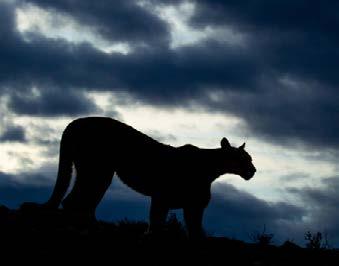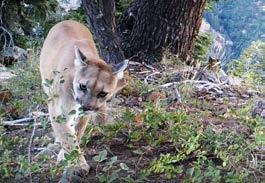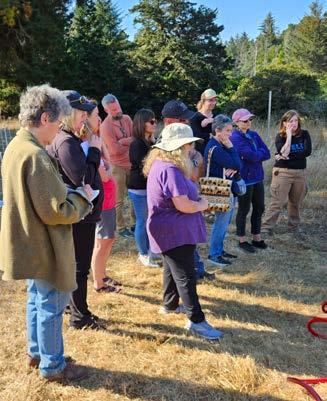SAVING LIONS

NEWS FROM THE MOUNTAIN LION FOUNDATION Volume 36, Issue 2 | Fall+Winter 2023
■ FROM THE DIRECTOR
Dear friend,
This autumn marks my one-year anniversary at the Mountain Lion Foundation, and what a year of transition and growth it has been! Thanks to the steadfast support of members like you, we are watching out for mountain lions across the West.

In this newsletter, you’ll read about legal action we’re taking in Utah, an attempt to overturn one of the worst laws in recent history for mountain lions. You’ll learn about a ballot initiative in Colorado that would ban cougar hunting statewide. And you’ll travel to the bucolic sites where we piloted two new, powerful programs designed to help communities in mountain lion country coexist peacefully with their puma neighbors.
If you also follow us digitally, you’ll see that we’ve greatly expanded our communication efforts. Our Living with Lions webinars provide valuable information to people seeking tips and advice on how to live, work or recreate in lion county. Through our website, social media and e-newsletters, we are reaching more people with positive, hopeful messages. Each new person who gains a greater understanding of the value of mountain lions is one more person ready to help us stop the various threats to these amazing creatures.
This year, with input from our supporters, our nonprofit partners, Tribal members and wildlife biologists, we crafted a new strategic plan, with these three key organizational priorities guiding the Mountain Lion Foundation’s programs:
1. Champion broad protections for mountain lions and their habitats across the United States.
2. Cultivate proactive, community-based coexistence for people and lions.
3. Foster appreciation of mountain lions and their ecological significance.
On the Cover→
Mountain lions in Utah are currently pressured by year-round hunting, a new threat that the Mountain Lion Foundation is aiming to reverse. Photo: Sean Hoover
All of this work will happen in collaboration with a broad network of allies. In the past year, we have built and rebuilt bridges with organizations in California and beyond. We have met with state agencies, united with strong partners and engaged with mountain lion advocates of all stripes. We have welcomed many new members and reached more diverse audiences, both online and offline. The Mountain Lion Foundation is stronger than ever before. Thank you for taking this journey with us.
With respect and appreciation
R.
Lyles, Executive
Director
BOARD OF DIRECTORS
Toby Cooper
Bob McCoy • Chair
Don Molde, MD • Secretary
Bruce Rylander • Treasurer
Jim Sanderson, PhD
Elizabeth Sullivan
Fauna Tomlinson
Chris Tromborg, PhD • Vice-Chair

STAFF

Gowan Batist • Coexistence Programs Manager
Lou Galgani • Membership Coordinator
R. Brent Lyles • Executive Director
Erika Mathews • Director of Development
Paige Munson • State Policy Associate
Chelsea Robinson • Operations Manager
Josh Rosenau • Director of Policy & Advocacy
Lace Thornberg • Director of Communications
Mountain Lion Foundation • PO Box 1896 • Sacramento, CA 95812 • mountainlion.org • (916) 442.2666
Brent
Coloradans Go Wild for Wild Cats

A 2024 referendum to protect Colorado’s mountain lions, bobcats and lynx
by Josh Rosenau, Director of Policy & Advocacy
Call it a vote in Vail, a ballot initiative in Boulder, or a plebiscite in Pueblo … we could go on alliteratively for a while, but here’s the exciting news: Colorado voters will soon have a chance to put an end to mountain lion hunting within their state.
In November 2020, Colorado voters narrowly approved a ballot measure to restore wolves to the Rocky Mountain state’s wilderness. With Colorado Parks and Wildlife officials now looking for a state to donate the wolves that will populate Colorado’s public lands, wilderness advocates have turned their attention to an apex carnivore that was never extirpated — their mountain lions.
The Mountain Lion Foundation is an active member of Cats Aren’t Trophies – a coalition of groups representing advocates from Durango to Denver, that has filed for a referendum that will end trophy hunting of mountain lions and bobcats in the state. Once state election officials sign off on it, the measure will be placed on the November 2024 ballot for approval by voters.
If adopted, Colorado and California would stand as the two states which have protected mountain lions from all recreational hunting. The Mountain Lion Foundation was founded by leaders of the successful
referendum campaign in California and has been proud to support the Colorado residents who are leading the charge to end trophy hunts for mountain lions in their state.
The ballot measure would establish a new section of Colorado law, declaring that “Trophy hunting of a mountain lion, bobcat, or lynx by any means is prohibited.” Voters will be asked to agree that “trophy hunting of mountain lions, bobcats, and lynx serves no socially acceptable or ecologically beneficial purpose,” and to outlaw any hunting except that specifically authorized by state agencies as a response to livestock depredations or immediate risk to people. Even in such cases, the law would make clear that lethal responses cannot be contemplated until “appropriate nonlethal methods…have been taken” according to rules set by the state Department of Parks and Wildlife.
We are thrilled to see Coloradans stepping up to protect mountain lions in the Rocky Mountain State. Ballot initiatives have been key to protecting mountain lions from cruel and unnecessary hunting, and the Mountain Lion Foundation is looking forward to continued work with this campaign to ensure that Colorado wildlife policy is built on a foundation of the best science and a true reflection of Coloradans’ love for the outdoors.■
Photo: U.S. Fish & Wildlife Service
■ UPCOMING WEBINARS
Each month, our Living with Lions webinars highlight the various challenges that mountain lions face, as well as the often straightforward solutions that make it possible for us to live beside them.
Join us as we dive in deep with people who have passion and knowledge to share — scientists, journalists, authors, adventurers, advocates, policymakers, and more.
Oct. 18: Finding the Light with photographer Savannah Rose
Nov. 15: Tales of the Urban Wild with scientist Tiffany Yap
Dec. 6: Year in Review with executive director R. Brent Lyles
Visit our event calendar to register: mountainlion.org/events-calendar
Puma Protector Nora Parker
Our members come from across the country and all love animals
by Erika Mathews, Director of Development
Nora Parker simply loves animals, both wild and domestic.

Nora was motivated to join our monthly giving program and become a Puma Protector because she appreciates that the Mountain Lion Foundation advances legislation and policies designed to preserve the mountains lions in our country — “before the situation reaches a point of no return and we lose them altogether.” She also appreciates our outreach efforts: “The educational opportunities you provide are invaluable in encouraging people to understand and appreciate this beautiful native species, while providing scientific and rational approaches to living in harmony in shared environments and dispelling unnecessary fear of generally peaceful animals.”
Mountain lions aren’t likely to reappear in New Jersey, where Nora lives, anytime soon, but that doesn’t damper her enthusiasm for the health of this species. “Even if you may never have the chance to see a mountain lion yourself, the Mountain Lion Foundation provides so many wonderful ways for you to enjoy their natural lifestyles and be motivated to keep them safe.”■
To learn how your monthly gifts can propel mountain lion conservation forward, visit https://bit.ly/Puma-Protector or email EMathews@mountainlion.org.
LEAVE YOUR LEGACY
Deepen your commitment to mountain lions with a simple, impactful legacy gift.
A bequest to the Mountain Lion Foundation in your will or trust ensures a close watch over cougars for decades to come.

For questions about legacy gifts, please contact Erika Mathews at (916) 442.2666, ext.105 or emathews@mountainlion.org.
Sample gift langauge available at https://mountainlion.planned.gifts
Photo: Sebastian Kennerknecht
After Utah passed H.B. 469, a bill that allowed for yearround hunting of mountain lions, legalizes trapping of cougars, and reduces state officials’ ability to prevent overhunting, the Mountain Lion Foundation resolved to challenge this harmful legislation as unconstitutional.
Working with partners in Utah, we have retained outside counsel to make this argument based on the Utah Constitution’s “right to hunt and fish” provision under Article I, Section 30: “The individual right of the people to hunt and to fish is a valued part of the State’s heritage and shall be forever preserved for the public good.” This right “includes the right to use traditional methods to hunt and to fish….to: (a) promote wildlife conversation and management; (b) provide reasonable regulation of hunting and fishing activities; and (c) preserve the future of hunting and fishing.”
As our attorney for this case, Jessica L. Blome, of Greenfire Law, explained, “This provision has never been the subject of litigation before, but the plain language is clear: preservation, regulation, and conservation are intrinsically intertwined with the right to hunt. Thus, it would be antithetical to both the spirit and letter of the Utah Constitution for the legislature to permit a hunted population to be whittled down to the point where, in practice, it could not be hunted.”
Lawmakers passed the amendment with little public notice and no clear justification. The prime sponsor explained the amendment by claiming, contrary to research by field biologists, “we’re getting an increase in our cougar numbers across the state.” By allowing year-round hunting with no permit required, the bill is intended to, and surely will, result in overhunting, orphaning of cubs, and other damage to mountain lions and their ecosystems.
Cougars play a critical role in Utah’s ecosystems. Cougars have more ecological interactions with other species than any other carnivore studied, serving as a keystone for ecological balance. Their removal doesn’t just harm their prey populations, but also affects

All in for Utah’s Mountain Lions
plants, birds, fish, and insects. Because hunters favor larger trophy lions, hunting results in populations with larger percentages of young lions. Young lions are the most frequent sources of livestock depredation, and as a result, overhunting has been shown to increase the likelihood of conflict.
Wildlife managers throughout the range of mountain lions have ended year-round hunting and outlawed trapping of mountain lions because the practices are cruel and disruptive to the species. Seasons are set to avoid the time when cubs are most dependent on their mothers. By removing that safe window, the law will inevitably orphan (and kill) far more cubs throughout Utah. Because the state has no existing regulations for mountain lion trapping, cougars could be left in traps for days, slowly starving, and suffering severe injuries as they attempt to escape. Because trapping leaves no opportunity to select a target, nursing mothers, cubs, and other mountain lions that are not normally legal to hunt will be caught and killed due to this law.
The passage of this disappointing legislation further underscores how important it is that the Mountain Lion Foundation expands our supporter base in every state with mountain lion populations to ensure a stronger voice for their protection.
Like you, many Utahns were appalled by this move and believe mountain lions should be awarded better protection. Together, we can reach those concerned citizens and galvanize them to get this harmful legislation off the books as soon as possible.■
FOR MORE LAW & POLICY UPDATES, VISIT MOUNTAINLION.ORG/STATE-BY-STATE

Going to court to challenge an appalling new law that allows for year-round mountain lion hunting and trapping
by Josh Rosenau, Director of Policy & Advocacy
FORGING CONNECTIONS Closing gaps
by Lace Thornberg, Director of Communications
Nearly 300 amphibians, over 300 reptiles, some 400 to 500 mammals, close to 800 birds and over 1,100 fish species inhabit America, with another 140,000 species of invertebrates flying, swimming, and spinning about.
So many species and yet we generally design, act and engineer with only one in mind — ourselves, the humans.
Since 1986, the Mountain Lion Foundation has focused on one of the other species – Puma concolor – and made it our mission to ask: what do cougars need to survive and thrive?
Through our policy work, educational outreach and practical support, the Mountain Lion Foundation helps people coexist peacefully alongside mountain lions.

Wherever they live close to us, mountain lions are at risk of being harassed and killed by people who are either hoping to prevent livestock losses or, in their minds, to preserve public safety. Given that reality, keeping mountain lions safely away from livestock and people is key to preventing mountain lion death. It’s also critical to widely share the science that clearly shows that killing a lion will only disrupt mountain lion’s territorial structures and enable more lions to frequent an area.
Over the decades, the practical implementation of our coexistence work has spanned the country and taken many forms.
We have constructed secure pens that have both protected livestock and significantly diffused community tension on locations stretching from Taylorville, California to Naples, Florida. We give many educational talks and offer public comments. And by making low-cost pen designs available online, we have helped thousands of people to secure their livestock and their pets.
In one notable example from 2016, we built four lion-proof pens in the Malibu Hills after an alpaca rancher applied for a depredation permit that would have led to the death of P-45, an integral member of the mountain lion gene pool in the Santa Monica Mountains. In California, where mountain lions are a specially protected species, the only legal way to intentionally kill a mountain lion is to seek a depredation permit from the California Department of Fish and Wildlife, wherein the agency allows people who have experienced property damage or loss to kill the animal suspected of causing the damage. Public outcry led to a call for a better alternative and numerous parties got involved. Retired actress Sheila Kuehl, then an L.A. County Supervisor, described the resolution as “a great example of the constructive ways that government, residents, nonprofits and activists can work together to forge a common-sense solution that is a win-win for wildlife and ranchers.”
A Knowledge Gap
As we have engaged in coexistence work, the Mountain Lion Foundation has prioritized addressing and closing the gaps we have encountered in the field of wildlife conservation.
Our Coexistence Programs Manager Gowan Batist has described one missing puzzle piece this way: “People enrolled in college and university agriculture programs don’t learn about wildlife, and few wildlife biologists or wildlife advocates ever get a firm educational grounding in agricultural production.”
Putting Coexistence Concepts into Practice

In early August, the Mountain Lion Foundation hosted a Coexistence Camp which brought wildlife advocates to a working ranch. We provided a boots-on-the-ground experience where participants could handle the tools of the trade and learn from one another. We investigated a real-life predator kill site, worked directly with a flock of sheep, installed scare devices and deterrents, and built an electric fence. Over the weekend, we heard a similar refrain many times: “I have often felt alone doing this work. It was great to meet other people with the same mindset. I feel inspired to keep going.”
Our aim is to train a network of people across the country from the wildland-urban interface – areas between open public lands and urban development which are also crucial to maintaining habitat connectivity for wildlife – who can help their communities to adopt practices that will prevent the native predators in their area from preying upon local livestock. This year’s participants had converged in Mendocino County from six western states, and, after this immersive training session, all were eager to return to their respective communities and assume their posts as Coexistence Ambassadors. Some ambassadors will
At left: Training a nationwide network of Coexistence Ambassadors will help our small staff keep up with cougar activity across the West.
Above: Gowan Batist, Coexistence Programs Manager. “From ranching alongside cougars for more than a decade, I know that providing real world prevention advice and straightforward solutions offers the best path forward.”
Opposite: At the White Salmon High School barn, our eager volunteers closed a literal gap, ensuring that the livestock in these pens used by a vocational agriculture youth program would no longer be vulnerable to the mountain lions that pass through the area.
focus on providing practical support in the times of conflict that can follow depredation events, some will focus more on public outreach events, and others are diving in on projects that make use of their unique talents and connections.
We will keep this cohort engaged with each other and provide ongoing online training to ensure that these ambassadors aren’t facing the often-challenging work of advocating for predators alone.
In late August, the Mountain Lion Foundation hosted Coexistence in Practice in Klickitat County, a rural Washington county where deliberate fearmongering has led cougars to be persecuted and pursued. Through this weekend-long event, area residents were invited to learn about cougar biology and behavior and to take part in hands-on activities that would ensure safety for livestock.
Working under a hot sun, our hearty volunteer crew completely enclosed all the pens along one side of a barn at the local high school; this fall, students in the agriculture program will repeat the enclosure fortification process on the other side of the barn while they learn about coexistence practices that can protect the goats they work so hard to raise.
Our talk and volunteer event were not only an important step forward in Klickitat County, but a template for how coexistence concepts can be infused into other communities around the country wherever similar conflicts arise. ■

PO Box 1896
Sacramento, CA 95812
mountainlion.org
(916) 442.2666
ATTEND A WEBINAR
Our Living with Lions webinars invite people across the country to learn about lions. Register at lnk.bio/mountainlion
COEXISTENCE IN PATAGONIA
This is Petaka, a protective mother to her cubs and the star of episode one of “Animals Up Close” with wildlife journalist Bertie Gregory.
Imagine our excitement when this episode featured one of the coexistence strategies that the Mountain Lion Foundation has long championed: livestock guardian dogs. In first-of-its-kind video footage, a puma is seen amidst a flock of sheep, but it is deterred from hunting by loud barking. Thank you, Bertie Gregory, for showing millions of viewers that livestock guardian dogs are an effective solution that can protect both sheep and pumas!■
U.S. Postage PAID Permit 1131 Sacramento, CA
GET MONTHLY UPDATES


Sign up at mountainlion.org/join-us for the latest cougar news, action alerts, research highlights and upcoming events.

 Photo: Roy Toft
Photo: Roy Toft
Non-Profit Org















 Photo: Roy Toft
Photo: Roy Toft